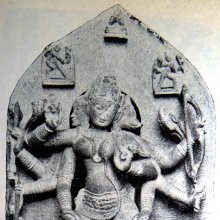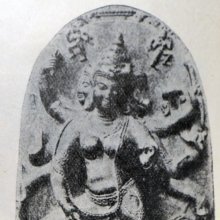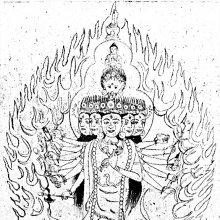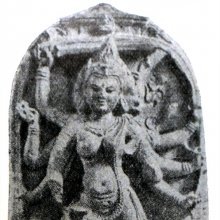Musala, Mushala, Muśala: 33 definitions
Introduction:
Musala means something in Buddhism, Pali, Hinduism, Sanskrit, Jainism, Prakrit, Marathi, Hindi. If you want to know the exact meaning, history, etymology or English translation of this term then check out the descriptions on this page. Add your comment or reference to a book if you want to contribute to this summary article.
The Sanskrit term Muśala can be transliterated into English as Musala or Mushala, using the IAST transliteration scheme (?).
Alternative spellings of this word include Musal.
Images (photo gallery)
In Hinduism
Purana and Itihasa (epic history)
Source: Google Books: The Purana IndexMusala (मुसल):—A weapon of Śeṣa; to exterminate all the Yādavas by the curse of sages; came out of Sāmba’s womb which was powdered and thrown into the sea; a piece was devoured by a fish, and a hunter who got it, shot it against Kṛṣṇa sitting, little knowing that he was the Lord; it was the cause of the Lord departing to heaven; other pieces became kuśa grass whih became in the hands of the Yādavas iron sticks with which they struck one another and died.
Source: archive.org: Puranic EncyclopediaMusala (मुसल).—A Brahmavādī son of Viśvāmitra. (Śloka 53, Chapter 4, Anuśāsana Parva).
Source: archive.org: Shiva Purana - English Translation1) Musala (मुसल) refers to a “(mortar) threshing rod”, according to the Śivapurāṇa 2.3.54 (“Description of the duties of the chaste wife”).—Accordingly, as a Brahmin lady said to Pārvatī: “[...] She shall not talk to any woman who disparages or hates her husband. She shall not stand alone anywhere nor shall she take bath in the nude. A chaste lady shall never sleep on a mortar threshing rod (musala) [nolūkhale na musale na], a broom, a grinding stone, a machine or on the threshold. Except at the time of sexual intercourse she shall never show her maturity and initiative. She shall like whatever her husband is interested in. [...]”.
2) Muśala (मुशल) refers to “mortars” and was used as a weapon in battle, according to the Śivapurāṇa 2.5.9 (“Śiva’s campaign”).—Accordingly, as Śiva with the Gods attacked Tripura: “[...] The leading gods as huge as mountains went ahead delighted and well-armed with all sorts of missiles, plough-shares, mortars (muśala), iron clubs and uprooted trees as huge as mountains. [...]”.
Source: Cologne Digital Sanskrit Dictionaries: The Purana Index1a) Musala (मुसल).—Diti not to sit on, in her pregnancy.*
- * Matsya-purāṇa 7. 38.
1b) A weapon of Śeṣa;1 to exterminate all the Yādavas by the curse of sages; came out of Sāmba's womb which was powdered and thrown into the sea; a piece was devoured by a fish, and a hunter who got it, shot it against Kṛṣṇa sitting, little knowing that he was the Lord; it was the cause of the Lord departing to heaven; other pieces became kuśa grass which became in the hands of the Yādavas iron sticks with which they struck one another and died.2
Source: JatLand: List of Mahabharata people and placesMusala (मुसल) is a name mentioned in the Mahābhārata (cf. XIII.4.52, XIII.4) and represents one of the many proper names used for people and places. Note: The Mahābhārata (mentioning Musala) is a Sanskrit epic poem consisting of 100,000 ślokas (metrical verses) and is over 2000 years old.
Source: Wisdomlib Libary: The Brahmāṇḍa-purāṇaMusala (मुसल) refers to “pestles” or “clubs” and represents one of the various weapons equipped by the Daityas in their war against Lalitā, according to the Brahmāṇḍa-purāṇa 4.22. Accordingly, “[...] thereupon, crores of Daityas producing reverberating chattering noise furiously prepared themselves (to fight) against Parameśvarī (Lalitā). [...] Crores of Daityas were fully equipped with coats of mail and had the following weapons and missiles in their hands [viz.: Musalas (pestles, clubs)], and thousands of similar weapons and missiles very dreadful and capable of destroying living beings”.

The Purana (पुराण, purāṇas) refers to Sanskrit literature preserving ancient India’s vast cultural history, including historical legends, religious ceremonies, various arts and sciences. The eighteen mahapuranas total over 400,000 shlokas (metrical couplets) and date to at least several centuries BCE.
Shilpashastra (iconography)
Source: Google Books: Elements of Hindu iconographyMusala is the name of the Indian woon pestle, which is an ordinary cylindrical rod of hard wood. There is no scope for the introduction of various shapes in relation to this plain weapon, and consequently it has remained unaltered in its form from early times.
Source: Google Books: Iconography of BalarāmaMusala (मुसल, “pestle”).—According to mythology, hala and musala are the original weapons of Ananta. They are also known as vaiṣṇava-praharanāni. The Harivaṃśa says they were first made available to Balarāma before his fight with King Jarāsandha of Rājagṛha. Sunanda and Saṃvartaka were the respective names of his divine weapons.
Source: Shodhganga: The significance of the mūla-beras (śilpa)Musala (मुसल, “pestle”) refers to one of the several “attributes” (āyudha) or “accessories” of a detiy commonly seen depicted in Hindu iconography, defined according to texts dealing with śilpa (arts and crafs), known as śilpaśāstras.—Musala is the name of the Indian wooden pestle, which is an ordinary cylindrical rod of hard wood. It can be used as an offensive weapon.

Shilpashastra (शिल्पशास्त्र, śilpaśāstra) represents the ancient Indian science (shastra) of creative arts (shilpa) such as sculpture, iconography and painting. Closely related to Vastushastra (architecture), they often share the same literature.
Dhanurveda (science of warfare)
Source: Wisdom Library: DhanurvedaMusala (मुसल) refers to a kind of weapon (mace or club). It is a Sanskrit word defined in the Dhanurveda-saṃhitā, which contains a list of no less than 117 weapons. The Dhanurveda-saṃhitā is said to have been composed by the sage Vasiṣṭha, who in turn transmitted it trough a tradition of sages, which can eventually be traced to Śiva and Brahmā.
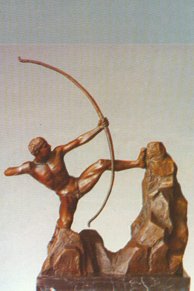
Dhanurveda (धनुर्वेद) refers to the “knowledge of warfare” and, as an upaveda, is associated with the Ṛgveda. It contains instructions on warfare, archery and ancient Indian martial arts, dating back to the 2nd-3rd millennium BCE.
Shaktism (Shakta philosophy)
Source: Google Books: ManthanabhairavatantramMuśala (मुशल) (Cf. Mudgara) refers to a “mortar”, according to the Ṣaṭsāhasrasaṃhitā, an expansion of the Kubjikāmatatantra: the earliest popular and most authoritative Tantra of the Kubjikā cult.—Accordingly, “The man of knowledge should mark the sacred fields located in the towns. Thus (this) category has been explained externally; now listen (to how it is) in the home. Prayāga is in the middle (of the house). Varuṇā is present in the door. Kollāpura is in the scissors. The stove is Aṭṭahāsaka. One should know that the threshing floor is Jayantī and Caritra is the mortar (in which grain is cleaned or threshed). The winnowing fan is said to be Ekāmraka and Devikoṭa is the grinding stone. (Thus there are) the dish (used to cover water jars), the bedstead, mortar (muśala), threshold, stove, winnowing fan and grinding stone. [...]”.

Shakta (शाक्त, śākta) or Shaktism (śāktism) represents a tradition of Hinduism where the Goddess (Devi) is revered and worshipped. Shakta literature includes a range of scriptures, including various Agamas and Tantras, although its roots may be traced back to the Vedas.
Ayurveda (science of life)
Toxicology (Study and Treatment of poison)
Source: Shodhganga: Kasyapa Samhita—Text on Visha Chikitsa1) Musala (मुसल) refers to a “pestle” (for powdering ingredients), according to the Kāśyapa Saṃhitā: an ancient Sanskrit text from the Pāñcarātra tradition dealing with both Tantra and Viṣacikitsā—an important topic from Āyurveda which deals with the study of Toxicology (Viṣavidyā or Sarpavidyā).—The tenth Adhyāya prescribes antidotes for Rājilā snake venom.—According to the Kāśyapasaṃhitā verse X.25: “Four to five handful or morsels of Turmeric, Vegā and root powdered with a pestle (musala-prahṛta) must be boiled with a quarter measure of water. This must be used as Taila or oil. Vegāsthi Taila must be smeared on the victim. The same can be mixed with lukewarm water and the victim be bathed with it. This effectively alleviates the poison”.
2) Musalā (मुसला) is the name of an ingredient used in the treatment of snake-bites such as those caused by the Asṛṅmaṇḍalī-snakes, according to the Kāśyapa Saṃhitā.—Accordingly, one of the treatments is mentioned as follows: “[...] Lepa or ointment made from the roots of Punarnāvā, Ambaṣṭhā, Musalā and Kimśuka mixed with cowdung must be applied. Milk of latex yeilding trees boiled with white grains (rice) must be given after it cools down. Cool drinks arrest the poison of Asṛṅmaṇḍalī snakes”.

Āyurveda (आयुर्वेद, ayurveda) is a branch of Indian science dealing with medicine, herbalism, taxology, anatomy, surgery, alchemy and related topics. Traditional practice of Āyurveda in ancient India dates back to at least the first millenium BC. Literature is commonly written in Sanskrit using various poetic metres.
General definition (in Hinduism)
Source: Wisdom Library: HinduismMusala (मुसल) is a Sanskrit word for a weapon translating to “club”. Sculptures or other depictions of Hindu dieties are often seen holden this weapon in their hand.
In Buddhism
Tibetan Buddhism (Vajrayana or tantric Buddhism)
Source: Wisdom Library: Tibetan BuddhismMusalā (मुसला) is the name of Dūtī (i.e., messengers of Lord Vajrapāṇi) mentioned as attending the teachings in the 6th century Mañjuśrīmūlakalpa: one of the largest Kriyā Tantras devoted to Mañjuśrī (the Bodhisattva of wisdom) representing an encyclopedia of knowledge primarily concerned with ritualistic elements in Buddhism. The teachings in this text originate from Mañjuśrī and were taught to and by Buddha Śākyamuni in the presence of a large audience (including Musalā).
Source: academia.edu: The Structure and Meanings of the Heruka MaṇḍalaMuṣala (मुषल) refers to a “pestle” and represents one of the items held in the left hand of Heruka: one of the main deities of the Herukamaṇḍala described in the 10th century Ḍākārṇava chapter 15. Heruka is positioned in the Lotus (padma) at the center; He is the origin of all heroes; He has 17 faces (with three eyes on each) and 76 arms [holding, for example, muṣala]; He is half black and half green in color; He is dancing on a flaming sun placed on Bhairava and Kālarātrī.
Source: OSU Press: Cakrasamvara SamadhiMusala (मुसल) refers to a “club”, according to the Guru Mandala Worship (maṇḍalārcana) ritual often performed in combination with the Cakrasaṃvara Samādhi, which refers to the primary pūjā and sādhanā practice of Newah Mahāyāna-Vajrayāna Buddhists in Nepal.—Accordingly, “Oṃ homage to the fierce Vajrapāṇi, great vajra-anger, a Bhairava, With gigantic fangs, grasping in hand a sword, club (musala), ax and noose”.

Tibetan Buddhism includes schools such as Nyingma, Kadampa, Kagyu and Gelug. Their primary canon of literature is divided in two broad categories: The Kangyur, which consists of Buddha’s words, and the Tengyur, which includes commentaries from various sources. Esotericism and tantra techniques (vajrayāna) are collected indepently.
In Jainism
General definition (in Jainism)
Source: archive.org: TrisastisalakapurusacaritraMusala (मुसल) refers to a “cudgel”, according to chapter 2.2 [ajitanātha-caritra] of Hemacandra’s 11th century Triṣaṣṭiśalākāpuruṣacaritra: an ancient Sanskrit epic poem narrating the history and legends of sixty-three illustrious persons in Jainism.—(musalena ca yaṣṭi0). Meyer, p. 154, has the compound musalayaṣṭi (Mörserkolbenstange, Keulenstange). Shamasastry separates the words. Their commentator defines it—or them—as “pointed rods of khadira wood”.
Accordingly: “Sagara put in his heart archery and the characteristics of other weapons just from hearing them, as easily as his own name. He attained skill in fighting with the bow, sword and shield, dagger, arrow, axe, lance, javelin, club, kampaṇa (?), staff, spear, pike, plow-share, mace, cudgel (i.e., musala), pattiṣa, duḥsphoṭa (?), bhuṣaṇḍhī sling, arrow, trident, dart, and other weapons in conformity with the manuals. He became filled with all the arts like the full moon with digits, and he was adorned with good qualities, reverence, etc., like ornaments”.

Jainism is an Indian religion of Dharma whose doctrine revolves around harmlessness (ahimsa) towards every living being. The two major branches (Digambara and Svetambara) of Jainism stimulate self-control (or, shramana, ‘self-reliance’) and spiritual development through a path of peace for the soul to progess to the ultimate goal.
Languages of India and abroad
Pali-English dictionary
Source: BuddhaSasana: Concise Pali-English Dictionarymusala : (m.) a pestle.
Source: Sutta: The Pali Text Society's Pali-English DictionaryMusala, (m. nt.) (cp. Vedic musala. The etym. is probably to be connected with mṛd (see maddati)) 1. a pestle (whilst udukkhala is “mortar, ” cp. J. II, 428 & see udukkhala) D. I, 166=Pug. 55; DhA. II, 131 (+suppa). ‹-› 2. a club A. II, 241; VvA. 121.—3. a crowbar J. I, 199; PvA. 258 (°daṇḍa). (Page 539)

Pali is the language of the Tipiṭaka, which is the sacred canon of Theravāda Buddhism and contains much of the Buddha’s speech. Closeley related to Sanskrit, both languages are used interchangeably between religions.
Marathi-English dictionary
Source: DDSA: The Molesworth Marathi and English Dictionarymusala (मुसल).—n S A pestle &c. See the popular form musaḷa.
--- OR ---
musaḷa (मुसळ).—n (musala S) A pestle, esp. a wooden pestle used in husking rice. 2 A beam or an upright (any one of the three) of a sugarmill.
--- OR ---
musaḷā (मुसळा) [or ळ्या, ḷyā].—a (musaḷa) Sturdy, strapping, stalwart, lusty and loutish. 2 Applied as musaḷajhujhyā q. v.
Source: DDSA: The Aryabhusan school dictionary, Marathi-Englishmusaḷa (मुसळ).—n A pestle. A beam of a sugar- mill. musaḷa pāṅgharaṇēṃ or ḍōkyālā bāndhaṇēṃ To begin a shameless behaviour. musaḷāsa aṅkura phuṭaṇēṃ To resume one's social rela- tions-after long illness &c. sagaḷēṃ musaḷa kērānta Used of an impossibility or a matter regarded as incredible.
--- OR ---
musaḷā (मुसळा).—
Marathi is an Indo-European language having over 70 million native speakers people in (predominantly) Maharashtra India. Marathi, like many other Indo-Aryan languages, evolved from early forms of Prakrit, which itself is a subset of Sanskrit, one of the most ancient languages of the world.
Sanskrit dictionary
Source: DDSA: The practical Sanskrit-English dictionaryMuśala (मुशल).—A staff, stick; मुशलशब्दश्च दण्डे प्रसिद्धः (muśalaśabdaśca daṇḍe prasiddhaḥ) ŚB. on MS.4.2.18.
Derivable forms: muśalam (मुशलम्).
--- OR ---
Musala (मुसल).—
1) A mace, club; मुसला इव मे घ्नन्ति नेमे बाणाः शिखण्डिनः (musalā iva me ghnanti neme bāṇāḥ śikhaṇḍinaḥ) Mahābhārata (Bombay) 6.119.62.
2) A pestle (used for cleaning rice); मुसलमिदमियं च पातकाले मुहुरनुयाति कलेन हुंकृतेन (musalamidamiyaṃ ca pātakāle muhuranuyāti kalena huṃkṛtena) Mu.1.4; Manusmṛti 6.56.
3) A kind of surgical instrument.
4) The clapper of a bell (Mar. loḷī).
5) Name of a constellation.
Derivable forms: musalaḥ (मुसलः), musalam (मुसलम्).
Source: Cologne Digital Sanskrit Dictionaries: Shabda-Sagara Sanskrit-English DictionaryMuṣala (मुषल).—m.
(-laḥ) 1. A club, a mace. 2. A pestle for cleaning rice. f. (-lī) 1. A house-lizard. 2. A plant, (Curculigo orchioides:) see muśalī, musala, and musalī .
--- OR ---
Musala (मुसल).—n.
(-laṃ) 1. A pestle, a wooden pestle used for cleaning rice. 2. A club. f. (-lī) 1. A plant, (Curculigo orchioides.) 2. A houselizard. E. mus to break, aff. kalac; it is also read with its compounds and derivatives muṣala, muṣalī, and sometimes muśala, &c.
Source: Cologne Digital Sanskrit Dictionaries: Benfey Sanskrit-English DictionaryMuśala (मुशल).—muṣala muṣ + ala (see mus), and musala mus + ala, I. m. n. A pestle, a club, [Arjunasamāgama] 10, 5 (ṣ). Ii. f. li. A house-lizard.
--- OR ---
Muṣala (मुषल).—see muśala and musala.
--- OR ---
Musala (मुसल).—[mus + ala], also muṣala muṣ + ala (see mus), n. 1. A pestle, [Mānavadharmaśāstra] 3, 88 (s). 2. A club. Cf. muśala.
Source: Cologne Digital Sanskrit Dictionaries: Cappeller Sanskrit-English DictionaryMusala (मुसल).—[masculine] [neuter] pestle, mace, club, bell-clapper.
Source: Cologne Digital Sanskrit Dictionaries: Monier-Williams Sanskrit-English Dictionary1) Muśala (मुशल):—likā, lin See musala etc.
2) Muṣala (मुषल):—lya See musala etc.
3) Musala (मुसल):—[from mus] mn. (often spelt muśala or muṣala; cf. [Uṇādi-sūtra i, 108 [Scholiast or Commentator]]) a pestle, ([especially]) a wooden pestle used for cleaning rice, [Atharva-veda] etc., etc.
4) [v.s. ...] a mace, club, [Manu-smṛti; Mahābhārata] etc. (cf. cakra-m)
5) [v.s. ...] the clapper of a bell, [Kathāsaritsāgara]
6) [v.s. ...] a [particular] surgical instrument, [Suśruta]
7) [v.s. ...] a [particular] constellation, [Varāha-mihira’s Bṛhat-saṃhitā]
8) [v.s. ...] the 22nd [astronomy] Yoga or division of the moon’s path, [Monier-Williams’ Sanskrit-English Dictionary]
9) [v.s. ...] m. Name of a son of Viśvāmitra, [Mahābhārata]
Source: Cologne Digital Sanskrit Dictionaries: Yates Sanskrit-English Dictionary1) Muṣala (मुषल):—(laḥ) 1. m. A club; a pestle for cleaning rice. f. (lī) A house lizard; a plant (Curculigo orch.).
2) Musala (मुसल):—(laṃ) 1. n. A pestle, &c. like muṣala.
Source: DDSA: Paia-sadda-mahannavo; a comprehensive Prakrit Hindi dictionary (S)Musala (मुसल) in the Sanskrit language is related to the Prakrit word: Musala.
[Sanskrit to German]
Sanskrit, also spelled संस्कृतम् (saṃskṛtam), is an ancient language of India commonly seen as the grandmother of the Indo-European language family (even English!). Closely allied with Prakrit and Pali, Sanskrit is more exhaustive in both grammar and terms and has the most extensive collection of literature in the world, greatly surpassing its sister-languages Greek and Latin.
Hindi dictionary
Source: DDSA: A practical Hindi-English dictionaryMūsala (मूसल) [Also spelled musal]:—(nm) a spigot; pounder; pestle; ~[lacaṃda] stout, sturdy (person); ~[loṃ ḍhola bajānā] to be extremely happy; ~[lacaṃda, vāla bhāta meṃ] a wrong man in a wrong place, an intruder.
...
Prakrit-English dictionary
Source: DDSA: Paia-sadda-mahannavo; a comprehensive Prakrit Hindi dictionaryMusala (मुसल) in the Prakrit language is related to the Sanskrit word: Musala.
Prakrit is an ancient language closely associated with both Pali and Sanskrit. Jain literature is often composed in this language or sub-dialects, such as the Agamas and their commentaries which are written in Ardhamagadhi and Maharashtri Prakrit. The earliest extant texts can be dated to as early as the 4th century BCE although core portions might be older.
Kannada-English dictionary
Source: Alar: Kannada-English corpusMuśala (ಮುಶಲ):—
1) [noun] a long, round tool for pounding or grinding substances in a mortar; a pestle.
2) [noun] a pestle or mace-like weapon.
3) [noun] a short, thick stick; a staff.
--- OR ---
Musala (ಮುಸಲ):—
1) [noun] a long, round tool for pounding or grinding substances in a mortar; a pestle.
2) [noun] a pestle-like weapon.
3) [noun] a heavy medieval war club; a mace.
4) [noun] the moving part inside a bell, that strikes the side of the bell; a tongue; a clapper.
5) [noun] a kind of medical implement used in surgery.
6) [noun] a Northern constellation in the Milky Way, between Cygnus and Andromeda; the Lacerta.
7) [noun] ಮುಸಲಾಗ್ರ ಬುದ್ಧಿ [musalagra buddhi] musalāgra buddhi the quality of being very slow in perceiving, feeling or understanding; lack of intelligence; bluntness.
--- OR ---
Musala (ಮುಸಲ):—[noun] = ಮುಸಲ್ಮಾನ [musalmana].
--- OR ---
Musaḷa (ಮುಸಳ):—[noun] = ಮುಸಲ [musala]1.
Kannada is a Dravidian language (as opposed to the Indo-European language family) mainly spoken in the southwestern region of India.
See also (Relevant definitions)
Starts with (+10): Mucalai, Mucalakan, Mucalam, Musaladevata, Musaladhara, Musaladhare, Musalaghata, Musalahasta, Musalahati, Musalajhujhya, Musalaka, Musalakanda, Musalaman, Musalamana, Musalamana-jutta, Musalamani, Musalamu, Musalamusali, Musalanem, Musalapanaya.
Ends with: Asimusala, Cakramushala, Chakramushala, Dhasamusala, Kandarpamushala, Kankalamusala, Nistrimshamusala, Rathamushala, Romusala, Sannamusala, Semarmusala, Ulukhalamusala.
Full-text (+87): Musalin, Kandarpamushala, Musalamusali, Musalita, Mausalya, Cakramushala, Musra, Musalya, Musali, Musalayudha, Mausala, Musalaka, Sannamusala, Musalolukhala, Mahajangha, Musalasana, Bhatakande-tandula, Udukkhala, Musalem Konaphala, Musalakanda.
Relevant text
Search found 41 books and stories containing Musala, Musaḷa, Musaḷā, Musalā, Muśala, Muṣala, Mūṣala, Mūsala, Mushala; (plurals include: Musalas, Musaḷas, Musaḷās, Musalās, Muśalas, Muṣalas, Mūṣalas, Mūsalas, Mushalas). You can also click to the full overview containing English textual excerpts. Below are direct links for the most relevant articles:
Garga Samhita (English) (by Danavir Goswami)
Verse 5.24.35 < [Chapter 24 - The Killing of the Kola Demon]
Verses 5.24.33-34 < [Chapter 24 - The Killing of the Kola Demon]
Verses 6.1.44-47 < [Chapter 1 - Jarāsandha’s Defeat]
The Skanda Purana (by G. V. Tagare)
Chapter 237 - Greatness of Vajreśvara (Vajra-īśvara) < [Section 1 - Prabhāsa-kṣetra-māhātmya]
Chapter 63 - Dhanuḥsāhasraka (dhanuḥsāhasraka-īśvara-liṅga) < [Section 2 - Caturaśīti-liṅga-māhātmya]
Chapter 9 - The Greatness of Mahiṣakuṇḍa and Rudrasaras < [Section 1 - Avantīkṣetra-māhātmya]
The Sacrifices of Rajasuya, Vajapeya and Ashvamedha (study) (by Aparna Dhar)
Use of Sacrificial Utensils or Yajñayudha < [Chapter 2 - Vedic Sacrifices described in the Śatapatha Brāhmaṇa]
Harivamsha Purana (by Manmatha Nath Dutt)
Chapter 34 - The Mountains Set Asuras Fighting with the Gods < [Book 3 - Bhavishya Parva]
Chapter 41 - The Incarnations of Vishnu < [Book 1 - Harivamsa Parva]
Chaitanya Bhagavata (by Bhumipati Dāsa)
Verse 2.5.93 < [Chapter 5 - Lord Nityānanda’s Vyāsa-pūjā Ceremony and His Darśana of the Lord’s Six-armed Form]
Verse 2.8.65 < [Chapter 8 - The Manifestation of Opulences]
Verse 3.8.27 < [Chapter 8 - Mahāprabhu’s Water Sports in Narendra- sarovara]
The Indian Buddhist Iconography (by Benoytosh Bhattachacharyya)
Related products
.jpg)
